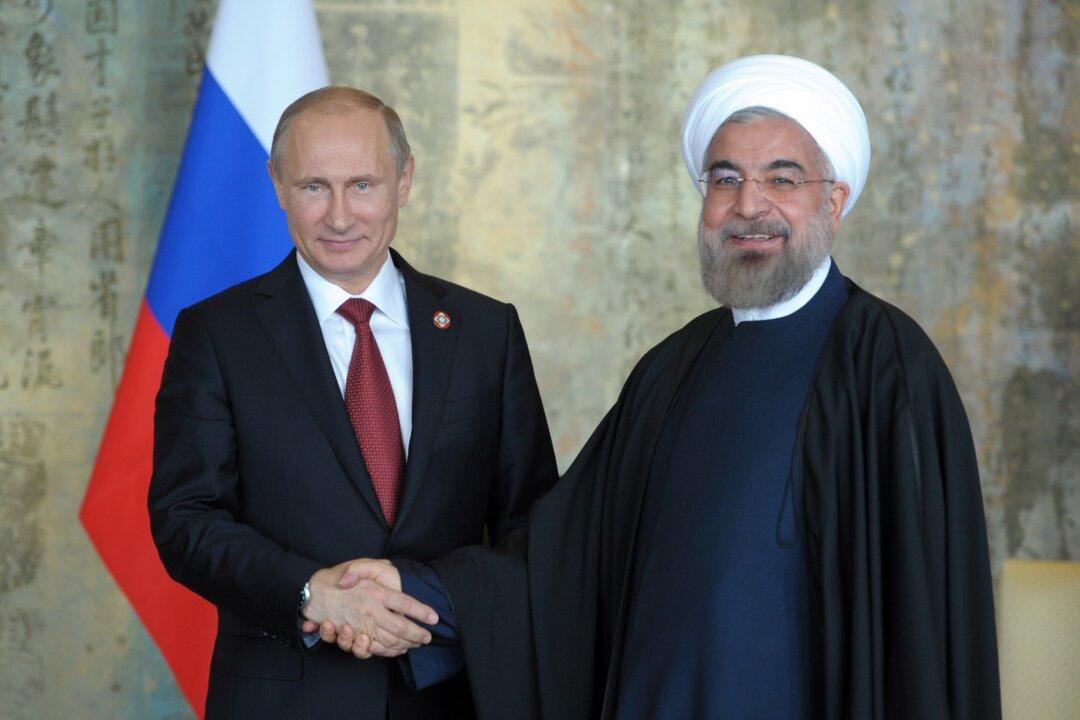After Iran’s Islamic revolution of 1978-79, periods of tension between Washington and Moscow have generally been synonymous with rapprochement between Moscow and Tehran. In keeping with this, the Ukrainian crisis and the conflict in Syria since spring 2011 have created new common interests between Iran and Russia.
Two narratives collide. On one hand the Western media presented the Maidan revolution in Ukraine as a “democratic revolution” against a Moscow-backed autocratic regime. From this perspective, the Russian strategy is to prevent the emergence of a democratic, pro-European regime on its border. The counter pro-Russian narrative, adhered to by some Iranian conservatives, holds that events in Ukraine are primarily the result of Western manipulation (including supposed funding from US foundations and, according to some Iranian conservatives, even support from Israel).
Despite their shared anti-Western perspective, it should be said that Tehran remained neutral, like Israel, over Russia’s annexation of Crimea. Not only has Tehran maintained its alliance with Moscow without compromising its belief in the territorial integrity of sovereign states, there is an economic dimension worth pointing out: Iran could potentially be an alternative to Russia in supplying gas to Ukraine.
The Syrian Dimension
With regard to Syria’s civil war, Iran and Russia both have reasons for providing financial and military help to the Syrian government against armed opposition movements supported by Gulf monarchies and Western powers. To have ensured the survival of Bashar al-Assad’s regime more than three years after the outbreak of the crisis is itself a diplomatic success for Tehran and Moscow.
Yet this has come at a price. Supporting Syria has worsened relations between Moscow, Tehran and the Gulf backers of the opposition groups – Saudi Arabia and Kuwait support Syrian salafi movements and Qatar the Syryan Muslim brotherhood. It has also damaged Russia and Iran’s standing in terms of Arab public opinion, which sees a regime that is opposed by the majority of Syrians. Having said that, the effects of Russia and Iran’s actions have been mitigated to a degree by the fact that the West did little to intervene in Syria for several years.
This convergence of views between Iran and Russia in the Middle East must be understood in the context of the struggle between the Western agenda on human rights and democracy and Russia’s diplomatic presentation of itself as a conservative power since Vladimir Putin resumed the presidency in 2012. For instance the Russian Orthodox church, an ideological pillar of the country’s nationalist revival, has developed a dialogue with Iran’s Shia clergy. This is within the framework of a wider dialogue between Orthodoxy and Islam that has existed since 1997.
The Reactor Factor
The Iranian-Russian partnership also appears to be increasing as a result of diplomatic progress on the nuclear issue. Russia was at the centre of negotiations that led to the conclusion of an interim agreement between Iran and the five permanent members of the UN Security Council (UK, China, Russia, France and the US) plus Germany in Geneva in November 2013 after ten years of diplomatic crisis. The agreement was based in part on a proposal first mooted by Russian foreign minister Sergei Lavrov two years earlier, and has raised the prospect of a possible final deal in the coming days.
Moscow has continued to resist following unilateral US and European sanctions over commercial relations with Iran and instead only applies sanctions adopted by the whole UN Security Council. Nonetheless, bilateral trade between Iran and Russia is declining, down from $3bn (£1.9bn) in 2011 to $2bn in 2012. This is because large Russian companies, particularly in the field of energy, are more susceptible than the Russian government to “friendly” pressure from the US to cease cooperation with Iran.
America Colours Everything
Despite their geopolitical rivalry in oil and gas, the main factor driving closer relations between Tehran and Moscow remains ongoing US-Iranian hostility dating back to the Islamic revolution. Iranian president Hassan Rohani’s main diplomatic goal is to use the dialogue with the West to reduce Iranian dependency on Russia and China.
But this does not mean he wishes to abandon cordial neighbourly ties towards Moscow, which remains a key bulwark against Western pressure. The aim is rather to give his country more flexibility in bargaining with its powerful northern neighbour by multiplying its diplomatic options.
From Moscow’s perspective, increased tensions with the West following the Ukrainian crisis increases the strategic need to strengthen relations with Iran. Yet hurdles to realising a real strategic alliance remain: mistrust inherited from a troubled past and an inescapable, inherent rivalry between two major energy producers. For these reasons, EU countries should now seek a rapprochement with Iran, above all to reduce their dependency on Russian gas imports.
Clément is also a teaching fellow at Sciences Po (Paris). This article was originally published on The Conversation. Read the original article.
